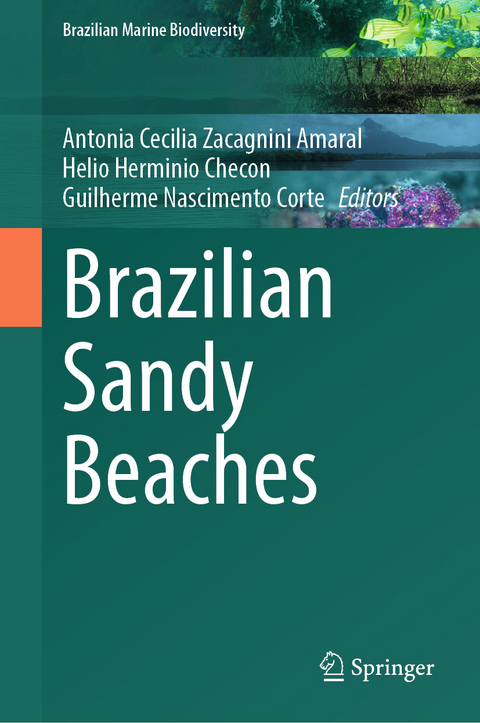
Brazilian Sandy Beaches
Springer International Publishing (Verlag)
978-3-031-30745-4 (ISBN)
More than 4000 beaches distributed along the Brazilian coastline are one of the country's main assets. They harbor endemic and diverse biota and provide numerous goods and services essential to human populations. However, they are under increasing pressure, trapped between the impacts of climate change and human activities in the terrestrial and marine environment, and the knowledge about their environmental characteristics and biodiversity is still insufficient to ensure their preservation. This book is the first-ever comprehensive work about Brazil's sandy beaches addressing their physical, ecological, and social aspects. It was written by an interdisciplinary group of leading Brazilian researchers from different regions of the country and also had the contribution of a few international experts. The information synthesized in this book is accessible to anyone who wants to know more about Brazilian coastal biodiversity and represents a significant step towards conserving Braziliansandy beaches, their biodiversity, and ecosystem services.
A. Cecília Z. Amaral is a Full Professor in the Biology Institute at the State University of Campinas, Brazil, which she joined in 1980. Her research focuses on marine benthic ecology and biodiversity, and she is a world expert in the taxonomy and ecology of annelids (polychaetes). Cecília actively participated in the development of Zoology in Brazil, and coordinated several multi-institutional projects such as the Assessment of the Sustainable Potential of Living Resources of the Brazilian Exclusive Economic Zone - REVIZEE / Score-Sul-Bentos; Biodiversity and Functioning of a Subtropical Coastal Ecosystem: Subsidies for Integrated Management - BIOTA/FAPESP; Biodiversity of Sandy Beaches (PROBIO); Endangered Species of Brazilian Fauna - Aquatic Invertebrates (IBAMA, MMA, SISBIO/ICMBio); and Consolidation of Scientific Collections of Marine Invertebrates: Strategies for Biodiversity Conservation - BIOTA/FAPESP. Helio H. Checon has a bachelor’s degree in Ecology (2010) from the State University of São Paulo and a master’s degree (2013) and a Ph.D. in Ecology (2017) from the State University of Campinas. From 2018 to 2021, he worked as a post-doctorate researcher at the Oceanographic Institute of the University of São Paulo. Currently, Helio is a research collaborator at the State University of Campinas (Brazil) and works as an environmental specialist in the management of protected areas of the municipality of Campinas, Brazil. He is also a member of the “Monitoring Network for Coastal Benthic Habitats” (ReBentos, Brazil) and the “International Association for Biological Oceanography” (IABO). Helio’s work has focused on researching the ecological aspects of the distribution of benthic organisms in coastal and marine environments, especially regarding the effects of anthropogenic disturbances, aiming to provide information and shortcuts for the effective management and conservation of coastal ecosystems, especially sandy beaches. Guilherme Corte is a professor at the University of the US Virgin Islands (USA) and obtained a master's degree (2011) and a Ph.D. in Ecology (2016) from the State University of Campinas (Brazil). As a marine ecologist, Guilherme has investigated the coasts of North and South America, the Caribbean, and Australia, and worked in several renowned institutions such as the State University of Campinas (Unicamp, Brazil), University of Sydney (Australia), University of São Paulo (USP, Brazil), Institute of Marine Research Admiral Paulo Moreira (IEAPM, Brazilian Navy), and Smithsonian Environmental Research Center (SERC, USA). Guilherme's research focuses on the interface between ecological science and the management of biological resources and seeks to provide ecological knowledge to preserve, manage, and enhance natural resources and ecosystems.
1. Characteristics of Brazilian Coastal Zone.- 2. Flora: mycrophytobenthos and phytoplankton.- 3. Meiofauna patterns of meiofauna on sandy beaches: abundance, diversity.- 4. Macrobenthic communities: abundance, diversity, spatial and temporal distribution.- 5. Nekton biodiversity.- 6. Secondary production of sandy beach macrofauna.- 7. Population biology of sandy beach macrofauna.- 8. Biological interactions Goods and services Threats and impacts.- 9. Management and conservation.- Index.
| Erscheinungsdatum | 28.09.2023 |
|---|---|
| Reihe/Serie | Brazilian Marine Biodiversity |
| Zusatzinfo | XXIII, 328 p. 81 illus., 73 illus. in color. |
| Verlagsort | Cham |
| Sprache | englisch |
| Maße | 155 x 235 mm |
| Gewicht | 685 g |
| Themenwelt | Naturwissenschaften ► Biologie ► Ökologie / Naturschutz |
| Schlagworte | Brazilian Shores • climate zones • Conservation Strategies • Management and Conservation • sandy beaches |
| ISBN-10 | 3-031-30745-3 / 3031307453 |
| ISBN-13 | 978-3-031-30745-4 / 9783031307454 |
| Zustand | Neuware |
| Haben Sie eine Frage zum Produkt? |
aus dem Bereich


